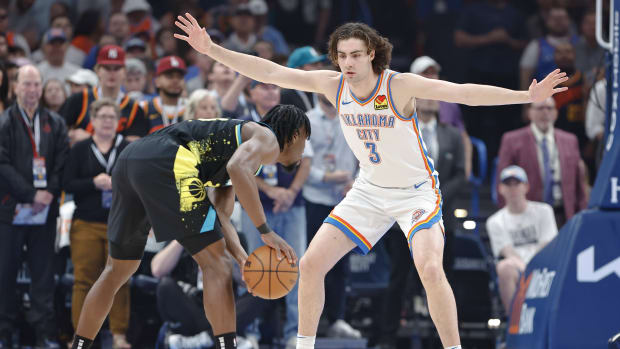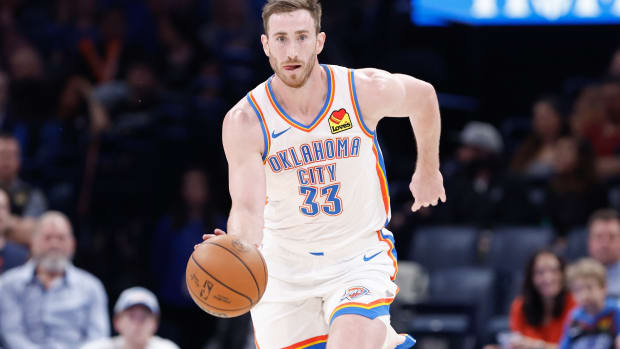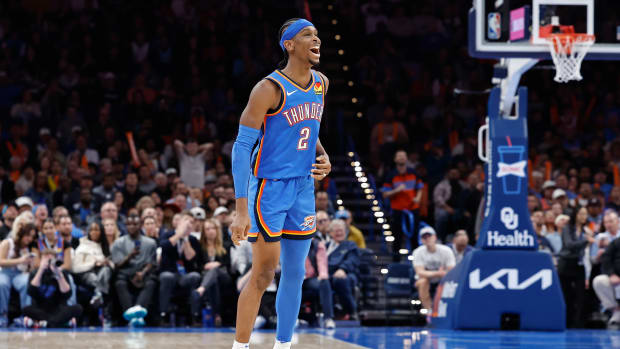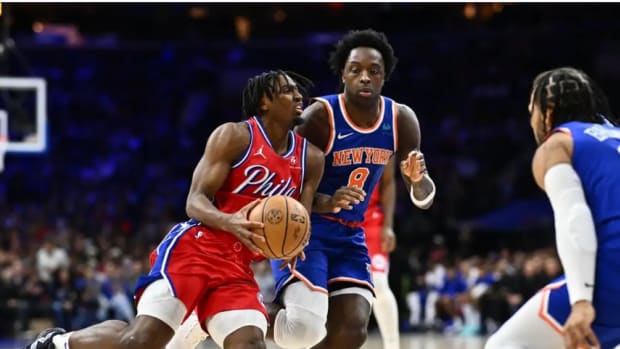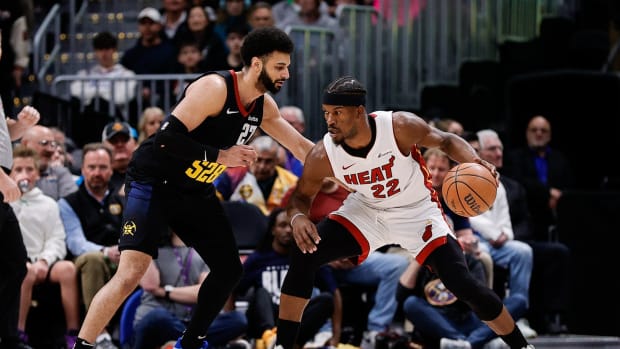Assessing How the NBA Should Handle the James Harden Dunk Situation
In the American legal system, if an attorney fails to raise an objection in a timely manner, the attorney usually forfeits the chance to raise that objection.
For instance, during a trial, an attorney might unwisely neglect to object to jurors seeing an important piece of evidence. The attorney’s client could then lose the case because jurors saw this evidence. In an appeal, the attorney would like to argue that the trial judge shouldn’t have admitted the evidence. The attorney might be right on the merits, but it’s probably too late. The appellate court would be inclined to rule that the attorney “failed to preserve the record”—meaning because he or she didn’t object during the trial, the attorney can’t raise the argument on appeal. Stated bluntly, the chance to object was lost.
The American legal system values finality, even when an outcome might seem unfair or flat out wrong. Finality provides order and predictability, and helps in the enforcement of court judgments, too. Finality is also more justifiable given that trial attorneys are supposed to know what to do during trials. If they fail to do something obvious and essential, the client could sue them for malpractice.
But that general rule isn’t always true. For instance, a judge who mismanages a trial or who misunderstands applicable procedure might spark confusion among the attorneys. In that situation, an attorney who fails to timely object might not have known better. The failure thus shouldn’t be held against him or her in an appeal.
Enter Tuesday night’s game between the Houston Rockets and the San Antonio Spurs at the AT&T center in downtown San Antonio. After being down 22 points in the third quarter, the Spurs climbed back and won the game, 135 to 133, in double overtime.
But the win wasn’t without controversy.
Rockets guard James Harden, who scored 50 points, was involved in a controversial play with 7:50 minutes left in the fourth quarter. He picked off a pass by Spurs forward DeMarre Carroll and dunked the ball so hard that the ball went through the net—and thus should have counted as two points—and then went back up.
While the dunked ball took an odd path, the scoring wasn’t debatable: once the ball clears the net, it counts. Rule 5 of the NBA rulebook makes this clear. “A legal field goal or free throw attempt shall be scored,” Rule 5 reads, “when a ball from the playing area enters the basket from above and remains in or passes through the net.”
Yet the referees mistakenly called off the basket, which in turn sparked confusion as to why the points didn’t count.
Confusion extends beyond the game
After the game, crew chief James Capers admitted that Harden’s dunk should have counted. Capers explained that, in the heat of the moment, it seemed Harden had interfered with the basketball before it cleared the net. This was a curious explanation since the referees didn’t call interference on the play.
Capers also claimed that Rockets head coach Mike D’Antoni had failed to request an instant review of the call within the allotted 30 seconds. Capers implied that D’Antoni unwisely used those 30 seconds to “protest” the call (but not ask for a review) and to try to get “clarification” on what had happened. Therefore, Capers reasoned, the “window passed” and the play was over and non-reviewable.
Stated in legal terms, Capers claims that D’Antoni failed to file a timely objection.
D’Antoni clearly sees the situation differently. According to ESPN’s Tim MacMahon, D’Antoni did challenge the call within the context in which the referees had explained it. “I heard that they said the ball hit James and went back through,” D’Antoni said after the game. “So it was a goaltend on James. I challenged that, and I didn’t get a response.” When D’Antoni was told by “another guy” (presumably a referee) that it wasn’t a goaltend but instead the ball went out of bounds on Harden, D’Antoni challenged that interpretation too. But he was apparently told he couldn’t initiate a challenge.
D’Antoni, therefore, could plausibly argue that he issued a timely objection based on the ruling as presented to him.
Do-Overs and Alternative History in the NBA
MacMahon says that a “Rockets source” is “optimistic” that the NBA will review the situation and either award the win to the Rockets or order that the final 7:50 be replayed.
The NBA doesn’t have much of a track record in holding “do-overs” of games. However, one example occurred in 2008. David Stern, who was NBA commissioner at the time, ordered that the final 51.9 seconds of a game played between the Atlanta Hawks and Miami Heat in Atlanta’s arena (then called the Philips Arena) be replayed. The reason: the official scorer mistakenly thought that that Heat center Shaquille O’Neal had six fouls when in fact he only had five. O’Neal thus fouled out when he should have been able to keep playing in a game that the Hawks would win in overtime. The Hawks would later win the “replayed” game, too.
An arguably more relevant example took place in December 1982. Then-NBA commissioner Larry O’Brien heard a protest from the San Antonio Spurs after they lost in double overtime to the Los Angeles Lakers. The protest followed a so-called “fake free throw” by Lakers guard Norm Nixon. The fake tricked the referees and induced a lane violation in a game played in November in San Antonio. Corey Hansford of Lakersnation.com explains what happened:
* * *
With just three seconds left and the Lakers down two points, Nixon was at the free throw line with one shot to come. This is where the controversy comes in. Nixon made his shooting motion, but didn’t actually shoot the ball.
Essentially, he faked a free throw, causing players from both sides to move into the lane. The official called a double lane violation and a jump ball. The Lakers would win the jump ball and Nixon hit a shot to tie the game, sending it into overtime. . . . The Spurs protested the finish, claiming that since Nixon never shot the ball there could be no lane violation and thus, no jump ball. They believed the referee should have simply reset the players in the lane and allowed Nixon to take his remaining free throw.
* * *
O’Brien ordered that the game be restarted with Nixon at the free throw line, with three seconds left in a game where the Lakers were down by two points. The replay occurred in April 1983, right before the Lakers were scheduled to play again in San Antonio. The replay led to the Spurs winning a game that they had previously lost.
Assessing how the NBA should handle the situation
If NBA commissioner Adam Silver were so inclined, he could order the replay of the final 7:50 of the Rockets-Spurs game when Rockets visit the AT&T center on April 12. Just like the Lakers-Spurs replay in April 1983, the final portion of the Rockets-Spurs game could be played before their regularly scheduled game on Sunday, April 12, at 2:30 pm central time. Perhaps fans with tickets to the April 12 game could be treated with access to the replayed game too. There would be other logistical issues, to be sure, including with respect to broadcast and TV sponsorship rights. However, the NBA, Rockets and Spurs have the wherewithal and expertise to handle those issues and reach sensible understandings with the various businesses and consumers who play a role in games. Of course, bettors and sportsbooks who won based on the Rockets winning might object to a replay of the game. However, they do not have credible standing to stop the NBA from taking action.
It’s very unlikely that Silver would unilaterally reverse the outcome of the Rockets-Spurs game. It’s unclear how the game would have ended if the Harden dunk had counted. After all, every play after the dunk would have been influenced in some way or another. The Rockets might have still won. To the extent the NBA takes action, a replay of the final 7:50 seems like a more reasonable approach than a reversal of the game’s outcome.
The harder question for Silver is whether he ought to order the replay. If he allows it here, does he open “Pandora’s Box” where he would be expected to do so again? Once Silver injects himself into a game to alter a referee’s mistake, other teams might demand he do so in future situations involving bad calls.
NBA games, like contests in any other league, are going to have bad calls and bad no-calls. Imperfect officiating is a quirk in every sport. It’s why the NFL didn’t replay the 2019 NFC Championship game between the New Orleans Saints and the Los Angeles Rams despite the referees’ horrendous “no call” on Los Angeles Rams cornerback Nickell Robey-Coleman Saints blatantly shoving Saints wide receiver Tommylee Lewis out-of-bounds. That no-call likely made the difference in which NFC team advanced to play the New England Patriots in Super Bowl LIII.
Silver could also reason that while the situation was confusing, D’Antoni could have explicitly asked for instant replay. According to Capers, D’Antoni didn’t do so.
In that same light, Silver might conclude that the adoption of instant replay for the 2019-20 season should avert the need for replayed games. Coaches have a chance to seek instant replay; if they fail to do so, or if they unwisely try to use the opportunity earlier in a game, that is on them.
On the other hand, Silver might decide that the integrity of NBA games warrants league intervention in exceptional and rare circumstances. Just like Stern and O’Brien before him, Silver might see certain unique situations as justifying replays. The trajectory of the ball in Harden’s dunk was bizarre and, clearly, perplexing for referees to understand within the context of game rules.
Also, it seems the referees told D’Antoni multiple and conflicting points about the ruling on the court. He can’t credibly be expected to appeal a ruling if he’s given contradictory information about the nature of the ruling. Silver, an attorney by trade, might find particular value in that point.
Silver could also place significance in the fact that his predecessors, Stern and O’Brien, ordered the replay of games without it triggering a flood of similar requests by other teams. The aforementioned worry about Pandora’s Box seems belied by the extraordinary rarity of replayed games in NBA history.
Silver might also wait to see if the Rockets protest the game. According to the NBA rulebook, the Rockets have 48 hours following the conclusion of the game to protest by email or fax. The protest would be filed by Rockets’ owner Tilman Fertitta or D’Antoni. A protest would also cost $10,000, though that amount would be returned if the Rockets prevailed.
A protest would lead to the league to solicit evidence from both the Rockets and Spurs. Silver would also want to hear from the referees. Silver would reach a decision within five days of the protest. If he orders a replay, he would want to clearly explain why this particular situation warranted his intervention and why teams shouldn’t expect him to adopt this approach with any regularity.
While Silver ordered the replay of the final 7:50 would be exceptional, it’s a possibility in these exceptional circumstances.
Michael McCann is SI’s Legal Analyst. He is also an attorney and the Director of the Sports and Entertainment Law Institute at the University of New Hampshire Franklin Pierce School of Law.































